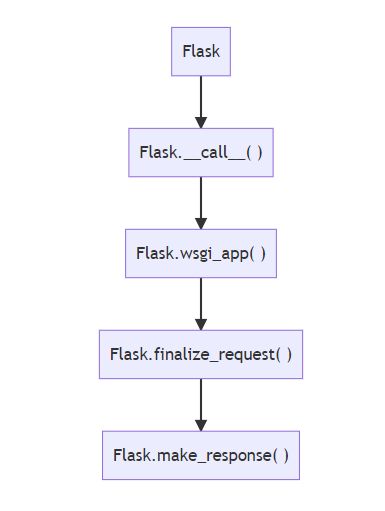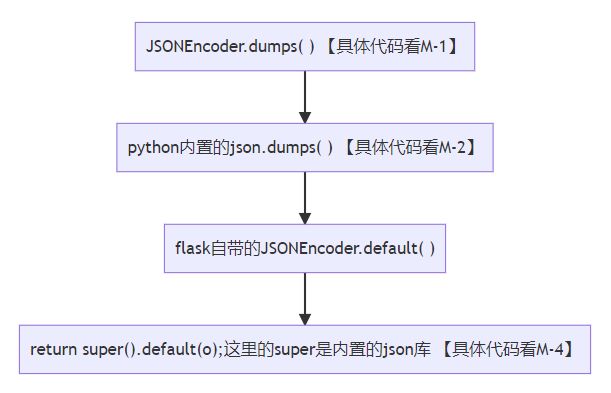目录
- 1、问题溯源
- 2、flask序列化
- 3、解决方法
1、问题溯源

重点就是一个Flask.make_response,这里会做请求的响应的处理。
里面行代码:
| elif isinstance(rv, dict): | |
| rv = jsonify(rv) |
rv是我需要返回的响应:
| { | |
| 'msg': [ | |
| {'roleName': 'guest', 'access_list':[<accessName root>]}, | |
| {'roleName': 'admin', 'access_list': [...]} | |
| ], | |
| 'error_no': | |
| } |
rv是一个字典,但是msg的里面有部分东西无法序列化,jsonify里面返回如下。
| return current_app.response_class( | |
| f"{dumps(data, indent=indent, separators=separators)}\n", | |
| mimetype=current_app.config["JSONIFY_MIMETYPE"], | |
| ) |
里面的data就是上面交道的类似json的数据(不是json,实际是对象)。
接下来:调用了flask下的自带的一个json库。

代码片段: M-1
| _dump_arg_defaults(kwargs, app=app) | |
| return _json.dumps(obj, **kwargs) |
代码片段: M -2
| if cls is None: | |
| cls = JSONEncoder | |
| return cls( | |
| skipkeys=skipkeys, ensure_ascii=ensure_ascii, | |
| check_circular=check_circular, allow_nan=allow_nan, indent=indent, | |
| separators=separators, default=default, sort_keys=sort_keys, | |
| **kw).encode(obj) | |
这里的obj的:
{'msg': [{...}, {...}], 'error_no': 0}
就是我们之前讲到的东西。
代码片段: M-4,这个是内置的json库的default方法。内置的没有实现序列化,所以需要自己在某个步骤接入到这个序列化的过程。
| def default(self, o): | |
| """Implement this method in a subclass such that it returns | |
| a serializable object for ``o``, or calls the base implementation | |
| (to raise a ``TypeError``). | |
| For example, to support arbitrary iterators, you could | |
| implement default like this:: | |
| def default(self, o): | |
| try: | |
| iterable = iter(o) | |
| except TypeError: | |
| pass | |
| else: | |
| return list(iterable) | |
| # Let the base class default method raise the TypeError | |
| return JSONEncoder.default(self, o) | |
| """ | |
| raise TypeError(f'Object of type {o.__class__.__name__} ' | |
| f'is not JSON serializable') |
o在这里就是AccessOrm是实例对象,所以他报错说这个:
Object of type AccessOrm is not JSON serializable
归因:就是flask没有自带实现对类的序列化
解决: 就是通过flask的机制,绑定一个序列化类。
2、flask序列化
flask代码里面写了:
| class JSONEncoder(_json.JSONEncoder): | |
| """The default JSON encoder. Handles extra types compared to the | |
| built-in :class:`json.JSONEncoder`. | |
| - :class:`datetime.datetime` and :class:`datetime.date` are | |
| serialized to :rfc:`` strings. This is the same as the HTTP | |
| date format. | |
| - :class:`uuid.UUID` is serialized to a string. | |
| - :class:`dataclasses.dataclass` is passed to | |
| :func:`dataclasses.asdict`. | |
| - :class:`~markupsafe.Markup` (or any object with a ``__html__`` | |
| method) will call the ``__html__`` method to get a string. | |
| Assign a subclass of this to :attr:`flask.Flask.json_encoder` or | |
| :attr:`flask.Blueprint.json_encoder` to override the default. | |
| """ |
在片段代码M-1中:
_dump_arg_defaults(kwargs, app=app)
函数内容如下:
| def _dump_arg_defaults( | |
| kwargs: t.Dict[str, t.Any], app: t.Optional["Flask"] = None | |
| ) -> None: | |
| """Inject default arguments for dump functions.""" | |
| if app is None: | |
| app = current_app | |
| if app: | |
| cls = app.json_encoder #app的json_encoder | |
| bp = app.blueprints.get(request.blueprint) if request else None # type: ignore | |
| if bp is not None and bp.json_encoder is not None: | |
| cls = bp.json_encoder #这里设置蓝图的json_encoder,蓝图的优先级高于app.json_encoder | |
| # Only set a custom encoder if it has custom behavior. This is | |
| # faster on PyPy. | |
| if cls is not _json.JSONEncoder: | |
| kwargs.setdefault("cls", cls) | |
| kwargs.setdefault("cls", cls) | |
| kwargs.setdefault("ensure_ascii", app.config["JSON_AS_ASCII"]) | |
| kwargs.setdefault("sort_keys", app.config["JSON_SORT_KEYS"]) | |
| else: | |
| kwargs.setdefault("sort_keys", True) | |
| kwargs.setdefault("cls", JSONEncoder) |
3、解决方法
使用自带的序列化类
在入口函数setup.py中写入
| from flask import Flask | |
| from flask.json import JSONEncoder | |
| from config import Config,LogConfig | |
| from db import init_db | |
| from scripts import user_cli | |
| from flask_bcrypt import Bcrypt | |
| from utils import RedisPool | |
| class ExtendJSONEncoder(JSONEncoder): | |
| def default(self, o): | |
| if getattr(o,'toJson'): | |
| return o.toJson(o) | |
| else: | |
| return super().default(o) | |
| flask_bcrypt = Bcrypt() | |
| def create_app(): | |
| Flask.json_encoder = ExtendJSONEncoder | |
| #之前在with app.app_context() | |
| #或者在app实例化之后,修改app的JSONEncoder 都没成功,这里简单粗暴一点,直接修改Flask的。 | |
| app = Flask(__name__) | |
| app.config.from_object(Config) | |
| LogConfig.openLog() | |
| from utils import initException,initBeforeRequestHandle | |
| with app.app_context(): | |
| init_db(app) | |
| RedisPool(app) | |
| initException(app) | |
| initBeforeRequestHandle(app) | |
| flask_bcrypt.init_app(app) | |
| app.cli.add_command(user_cli) | |
| import controller | |
| for bp in controller.__all__: | |
| app.register_blueprint(controller.__dict__[bp]) | |
| return app |
这时候,我的orm类需要一个toJson方法。
| class AccessOrm(Base): | |
| __tablename__ = 'access' | |
| id = Column(Integer, primary_key=True) | |
| accessName = Column(String(), nullable=True) | |
| def __repr__(self) -> str: | |
| return "<accessName {}>".format( | |
| self.accessName, | |
| ) | |
| def toJson(self,o): | |
| return { | |
| 'accessName': o.accessName, | |
| } |